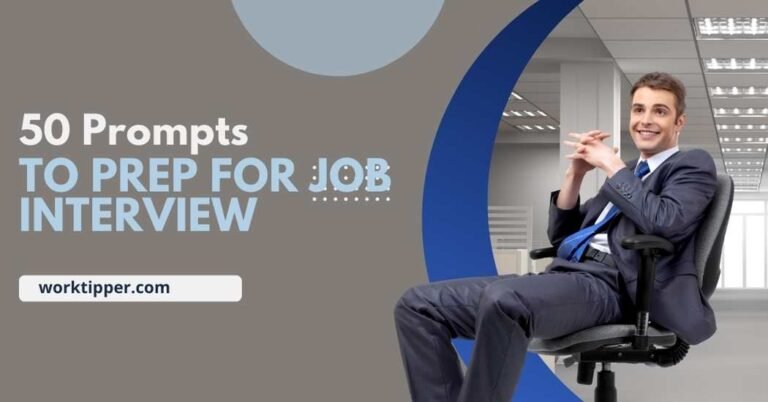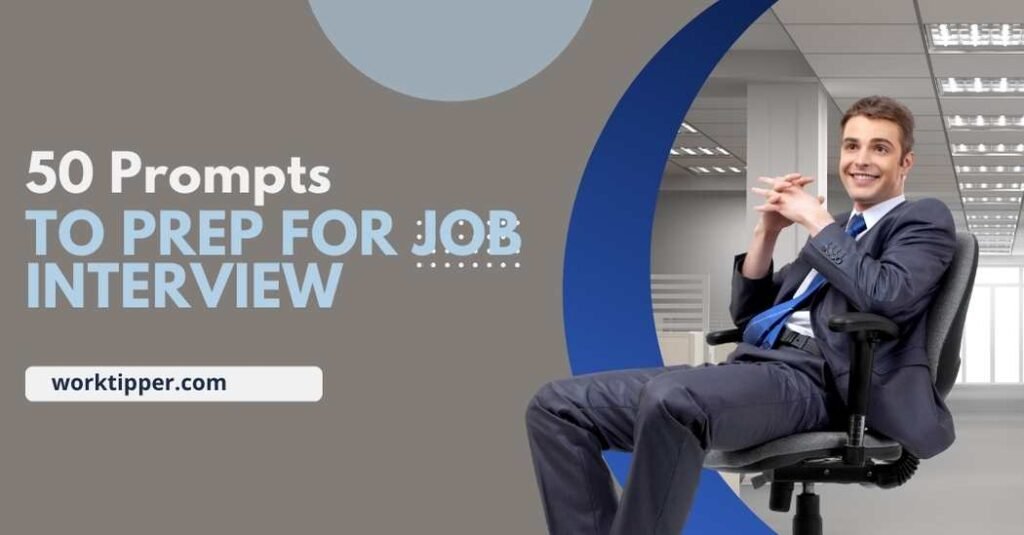
Certainly, here’s the introduction paragraph for the list of 50 genius ChatGPT prompts to help you prepare for job interviews:
“In the competitive world of job interviews, proper preparation can make all the difference. To help you shine in your next interview, we’ve compiled a list of 50 genius ChatGPT prompts. These prompts cover a wide array of common interview questions, allowing you to practice and refine your responses for various scenarios. Whether you’re a seasoned professional or a recent graduate, these prompts can assist you in showcasing your skills, experience, and professionalism. So, let’s dive into this invaluable resource to boost your interview readiness and increase your chances of landing that dream job.”

What is ChatGPT, and how does it work?
ChatGPT is a language model developed by OpenAI, specifically based on the GPT-3.5 architecture. It is designed to generate human-like text and engage in natural language conversations. Here’s how it works:
- Training Data: ChatGPT is trained on a diverse dataset that includes text from the internet, books, articles, and other sources. This extensive training data allows it to understand and generate text in a wide range of topics and writing styles.
- Transformer Architecture: ChatGPT is built on the transformer architecture, which is a type of neural network architecture. It consists of multiple layers of attention and feedforward neural networks, allowing it to understand context and relationships between words and phrases.
- Language Modeling: ChatGPT is essentially a language model. It learns to predict the likelihood of a word or phrase given its context in a sentence. This is done during the training process, where it learns to generate coherent and contextually relevant text.
- Conversational Context: What sets ChatGPT apart from earlier models is its ability to maintain conversational context. It can take previous messages in a conversation into account to generate responses that are contextually relevant. This enables it to engage in dynamic and natural-sounding conversations.
- Text Generation: When given a prompt or a question, ChatGPT generates text based on the patterns and information it learned during training. It attempts to provide coherent, informative, and contextually appropriate responses.
- Prompt-Based: ChatGPT is typically used in a prompt-based manner. Users input a prompt or a question, and the model generates a response based on that input. The quality of the response depends on the quality of the prompt and the model’s training data.
- Fine-Tuning: OpenAI fine-tunes ChatGPT on specific tasks and domains to make it more useful and controlled. This fine-tuning process ensures that it can be employed effectively in various applications, including customer support, content generation, and more.
- Ethical Considerations: OpenAI has implemented guidelines and safety measures to minimize harmful or inappropriate content generation by ChatGPT. They continue to work on improving the model’s behavior and safety.
In essence, ChatGPT is a versatile AI model that can understand and generate text, making it valuable for a wide range of applications such as content creation, chatbots, virtual assistants, and more. Its ability to engage in natural language conversations makes it a powerful tool for interacting with AI in a human-like manner.
Here are 50 genius ChatGPT prompts to help you prepare for job interviews:
- “Can you explain your professional background and experience in one minute?”
- “Describe a challenging project you’ve worked on and how you overcame obstacles.”
- “What do you consider your greatest strengths as a professional?”
- “Discuss a situation where you had to handle a difficult colleague or team member.”
- “How do you stay updated on industry trends and developments?”
- “What interests you about this company and role?”
- “Share an example of a time when you demonstrated strong leadership skills.”
- “What are your long-term career goals, and how does this position fit into them?”
- “Tell me about a time when you had to adapt to a sudden change in the workplace.”
- “How do you handle tight deadlines and multiple priorities?”
- “Discuss a situation where you had to resolve a conflict within your team.”
- “What software or tools are you proficient in that are relevant to this role?”
- “Explain your approach to problem-solving in a professional setting.”
- “How do you prioritize tasks to ensure project deadlines are met?”
- “Describe a successful project you’ve managed from start to finish.”
- “What’s the most valuable piece of feedback you’ve received from a supervisor?”
- “How do you handle feedback and constructive criticism?”
- “Discuss your experience working with cross-functional teams.”
- “Tell me about a time when you had to learn a new skill or technology quickly.”
- “What strategies do you use to maintain a healthy work-life balance?”
- “How would you describe your communication style in a team environment?”
- “What do you think is the most important quality for a leader to possess?”
- “Explain a complex concept or idea from your field to someone with no background in it.”
- “How do you handle high-pressure situations or tight deadlines?”
- “Discuss a situation where you had to influence a group to accept your ideas or proposals.”
- “Share an example of a time when you had to troubleshoot a technical issue.”
- “What role do ethics and integrity play in your decision-making process at work?”
- “Explain how you set and measure goals in your professional life.”
- “Tell me about a time when you had to make a tough decision with limited information.”
- “What do you do to stay motivated and productive on a daily basis?”
- “Describe a project where you worked under budget and exceeded expectations.”
- “How do you handle disagreements with colleagues or supervisors?”
- “Share an example of a time when you had to deliver a difficult message to a team member.”
- “What are your favorite productivity hacks or time management techniques?”
- “Discuss a situation where you had to manage a project with remote team members.”
- “Explain how you would approach mentoring or training a junior team member.”
- “What strategies do you use to foster innovation within your team or organization?”
- “Tell me about a time when you had to learn from a mistake or failure.”
- “How do you stay organized and keep track of important tasks and deadlines?”
- “Share an example of a time when you had to convince a client or customer to choose your solution.”
- “What do you think are the most important qualities of a successful team?”
- “Explain a time when you had to adapt to a major change in your industry or company.”
- “Discuss your experience with project management tools and methodologies.”
- “Tell me about a time when you had to lead a team through a period of uncertainty.”
- “How do you keep your technical skills up to date in a rapidly evolving field?”
- “Explain your approach to continuous improvement and professional development.”
- “What is your favorite book or resource related to your field, and why?”
- “Share an example of a time when you had to juggle multiple projects simultaneously.”
- “How do you ensure that your work aligns with the company’s mission and values?”
- “Discuss a situation where you had to collaborate with colleagues from diverse backgrounds.”
These prompts cover a wide range of interview questions, allowing you to practice and refine your responses for various scenarios. Good luck with your job interviews!
Here are some prompts and questions that can help you navigate the post-job interview phase effectively:
- Thank-You Email: “What should I include in my thank-you email to the interviewers to express my gratitude and reiterate my interest in the position?”
- Follow-Up Timeline: “When is the appropriate time to follow up after the interview if I haven’t heard back?”
- Feedback Request: “Is it appropriate to ask for feedback on my interview performance, and if so, how should I word the request?”
- Post-Interview Self-Evaluation: “How can I evaluate my own performance in the interview to identify areas for improvement in future interviews?”
- Continuing Networking: “What strategies can I employ to maintain a positive relationship with the interviewers or potential colleagues, even if I don’t get the job?”
- Offer Negotiation: “If I receive a job offer, what are the key points to consider during the negotiation process?”
- Multiple Offers: “If I receive multiple job offers, how can I make an informed decision on which one to accept?”
- Declining a Job Offer: “How can I decline a job offer politely and professionally if I decide it’s not the right fit for me?”
- Thanking References: “What’s the best way to thank my references for their support during the job application process?”
- Next Steps: “What can I do to continue my job search and stay motivated in case the current opportunity doesn’t work out?”